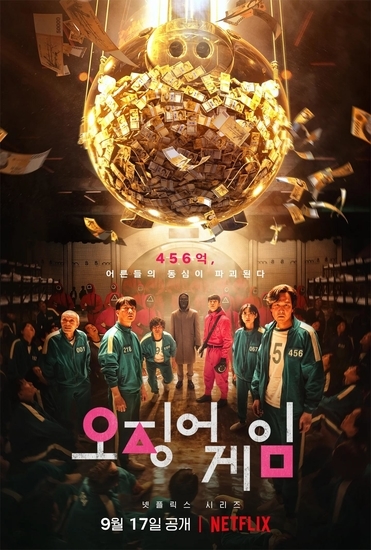‘Squid Game’ puts a lethal twist on childhood fun

Squid Game follows a group of desperate individuals who compete in deadly children’s games for a large cash prize.
October 8, 2021
If you’ve been active on any form of social media for the past few weeks, chances are you’ve at least heard of Netflix’s latest original series, “Squid Game.” The show, which has been out for less than a month, is already on track to become Netflix’s “biggest show ever,” according to CEO Ted Serandos.
It isn’t hard to see why the show has gained such widespread popularity, either. The intense plot and concise, nine-episode runtime make the series incredibly hard to put down once you’ve started. The show follows a group of people who all find themselves in dire financial straits and are offered an enormous cash prize for completing a series of seemingly innocent children’s games — with deadly consequences for losing.
A setup such as this could have easily turned formulaic and tedious, but showrunner Hwang Dong-Hyuk manages to keep the audience on their toes by defying expectations at nearly every turn. The plot is multi-layered without being too complex, and the choice to follow the story from multiple perspectives provides a more nuanced view on the subject matter and themes. However, some decisions regarding plot and character additions in the latter half led to some less-than-stellar moments in the final few episodes.
If I had to describe the show in one word, it would have to be harrowing. We are presented with characters who have truly hit rock bottom and are driven by sheer desperation. Every episode is populated by excellently crafted sequences that are maddeningly intense. Given the show’s nature, I told myself not to get too emotionally attached to any character, but the sympathetic writing and endearing character development quickly toppled those plans.
Speaking of characterization, the ensemble cast all fill their roles just about perfectly. From seasoned lead Lee Jung-jae to impressive first-time actor Jung Ho-yeon, the show’s character interactions are just about as engaging as the games they are forced to play. The show’s villains are also rather memorable; Heo Sung-tae portrays the ruthless gangster, and Jang Deok-su reminds me somewhat of a young Choi Min-Sik with his despicable, yet compelling nature.
The only exception is a certain group of characters whose introduction near the show’s ending seems entirely unnecessary and is rather insufferable to say the least. Those who have seen the show will likely know who I’m referring to, and while I understand the thematic relevance and social commentary they were intended to convey, I couldn’t help but feel like I was being taken out of the story every time one of them spoke.
Aside from those unfortunate additions to the cast, the only other complaints I have with the show come down to some overly cliché and rather implausible revelations made in the show’s final few episodes. The series falls for the trap of assuming the audience wants everything explained to them, when really, the motives and identities of those behind the games aren’t exactly essential to one’s appreciation of the story’s themes.
Overall, though, I can definitively say that the good outweighs the bad by a pretty large margin. And, boy, the show’s highs sure are high. I wouldn’t hesitate to recommend “Squid Game” to anyone searching for a riveting, rollercoaster experience that will have you clicking “next episode” faster than you can say “red light, green light.”








